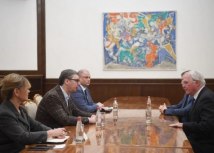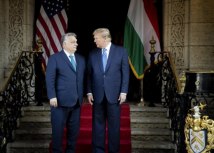Talking Turkey
We must support those standing up for values we share, but not expect a Turkish democracy to become France-on-the-Med anytime soon
Timothy Garton AshThe national symbols, flags and colours change - green in Iran, orange in Kiev, red in Istanbul - but the essence of the image is the same. A young, modern, urban, probably secular young woman faces the armed, helmeted, faceless man. He represents the forces of reaction, authoritarianism and domination, whether in the service of the Ayatollahs, president Vladimir Putin or this would-be sultan, Turkish prime minister Recep Tayyip Erdogan.
We see this iconography of peaceful protest, and we know at once where we stand. We stand with them. They are our people; we are their people. Influenced by the suggestive power of the visual images selected by television and newspaper picture editors, and by the spontaneous group preferences of social media, we somehow half-consciously feel it is the same long struggle.
In one way, this feeling is not entirely wrong. All over the world there is now a kind of Fifth International of young, better educated, mainly urban men and women who recognise and relate to each other everywhere from Shanghai to Caracas and Tehran to Moscow. Like the generation of 1968, but this time across the globe, they have something in common. That’s partly because they move around a lot, live and are educated in several places. Here in Berlin, I’ve just watched a Turkish-German or German-Turkish student called Ebru Dursun, who participated in the protests, calmly explain to German television viewers in impeccable German what is going on and to what protestors like her aspire.
In another way, this feeling can lead us dangerously astray. Each of these squares marks a different moment, in a very different context – and the outcomes have been starkly contrasting too. On Taksim square – until it was brutally cleared by water cannon, tear gas and baton-wielding police – there were also people from the country's Alevi minority, ‘anti-capitalist Muslims’, football fans from three rival clubs, Sufis, anarchists and yogis. All were united in one cause: to stop Erdogan becoming the new sultan, were he to take over next year as a strengthened, executive president.
When the prime minister returned to Turkey from a foreign trip, he mounted his double-decker bus and declaimed to his supporters: ‘from here I greet Istanbul’s sister cities, Sarajevo, Baku, Beirut, Cairo, Skopje, Baghdad, Damascus, Gaza, Ramallah, Mecca and Medina’. Phew. Most political leaders succumb to hubris after more than ten years in power. Erdogan, always an authoritarian personality, has done the same since his reelection in 2011, after which he cast aside his more independent-minded advisers, but this is hubris on a grand scale. One result is already certain: even if he stays in power, his international reputation will never recover. Ranting about ‘an end to tolerance’, about ‘vandals’, ‘provocateurs’ and ‘terrorists’, he has gone from being a regional beacon of hope to a symbol of fear.
We must also be clear what this was not. An improvised sign in what demonstrators called 'Resistanbul' read ‘Now Tahrir is Taksim’. But Taksim was never Tahrir, let alone Tiananmen, because Turkey is not a dictatorship. It is an electoral democracy: a very imperfect democracy, to be sure, with an eroded rule of law, inadequate minority rights, and an intimidated or manipulated mass media - Turkey has imprisoned more journalists than China – but still a democracy. And in the last election, Erdogan won 50% of the popular vote.
The other thing this definitely is not is what Erdogan darkly suggests it is: some kind of a western plot. The protesters we like to focus our cameras on may embrace what we regard as western and European values, but not as a result of any western or European policy. Ten years ago, when people in Turkey still believed that the European Union seriously meant its promise of negotiations leading to Turkish membership, one could view such mainfestations as part of a larger national journey ‘towards Europe’. But now that belief in the magnetic promise of EU membership has largely faded. So Turks are plainly embracing those values in and for themselves – not as the means to any geopolitical or economic end. In a backhanded way, this can be seen as a good thing. This is then a Turkish battle for Turkish freedoms, nothing more, nothing less.
Last week, I asked an astute Turkish political observer, fresh from Istanbul, what European leaders should say in response to 'Taksim'. His answer was: nothing. Leave it to the Turks. I agreed with him then, but I cannot now. Faced with such arrogant bullying of his own people by Erdogan, European leaders must speak out – even if, as happened to the EU enlargement commissioner Stefan Füle, Turkey’s would-be sultan pulls off his simultaneous interpretation headphones while the message is being delivered.
Yet we have to strike a balance. We need to show complete solidarity with those who are standing up for values we share, with those young women on the photos whom we instinctively recognise as ‘us’. Among them are quite a few who are, in fact, also ‘us’ in the narrower sense of living at least part of the time in Europe and being European citizens.
At the same time, we have to acknowledge that they did not win the last election and are unlikely to win the next one. Politically, a realistic outcome is that the current president Abdullah Gül, and his now more moderate tendency in the ruling party, could gain the upper hand. Even in a more genuinely liberal democracy, the 'Turkish model' would not be some French Republic in the eastern Mediterranean. It would, in the best case, combine secularism and democracy with recognition of Islam as the religion of the majority. As such, it could again become a magnet for much of the wider Middle East, as well as a serious candidate for membership of the European Union. If Turkey moves in that direction over the next few years, partly as a result of this Taksim moment, the tear-gassed protestors will not have cried in vain.
Timothy Garton Ash is Professor of European Studies at Oxford University, where he currently leads the www.freespeechdebate.com project, and a Senior Fellow at the Hoover Institution, Stanford University. His latest book is Facts are Subversive: Political Writing from a Decade Without a Name



